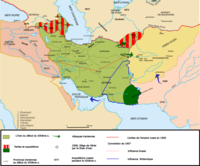Treaty of Akhal
| Akhal-Khorasan Boundary Convention | |
|---|---|
 Qajar Iran's loss of territories across the 19th century | |
| Location | Tehran |
| Effective | 21 September 1881 |
| Signatories | |
The Treaty of Akhal (Russian: Ахалский договор, Persian: پیمان آخال), also known as Akhal-Khorasan Boundary Convention, was an agreement signed between Qajar Iran and Imperial Russia on 21 September 1881 to mark Iran's official recognition of Khwarazm's (mostly the territory of present-day Turkmenistan) annexation by the Russian Empire.[1] The title of the treaty is derived from the name of the vast region north of Khorasan where the Turkmen tribe of Tekke lived – Akhal.[2]
Background[]
Although Iran had won a clear victory in the last Ottoman–Persian War (1821–23) over their Ottoman arch rivals, it had been considerably weakened by years of ineffective rulers, the defeat against Russia in 1813 and 1828 in which they lost all of the Caucasus, and with the increasing occupation by the British Empire of Egypt, during the years of 1873 to 1881.

In this critical juncture, Imperial Russia stepped up its campaign to prevent British expansion over Central Asia and sought to conquer Turkestan under the commandeering of Generals Mikhail Skobelev, Ivan Lazarev, and Konstantin Kaufman. Iran was unable to mount much of a defense, and Geok Tepe fell shortly. The immobilized Naser al-Din Shah Qajar was compelled to accept nominal defeat, and sent foreign secretary Mirza Saeed Khan Ansari to meet Ivan Zinoviev and sign a treaty in Tehran.
Treaty[]
By virtue of this treaty, Iran would henceforth cease any claim to all parts of Turkestan and Transoxiana, setting the Atrek River as the new boundary. Hence Merv, Sarakhs, Eshgh Abad, and the surrounding areas comprising modern-day Turkmenistan were transferred to Russia, where they would be the Transcaspian Oblast.[3]
References[]
- ^ Adle, Chahryar (2005). History of Civilizations of Central Asia: Towards the contemporary period: from the mid-nineteenth to the end of the twentieth century. UNESCO. pp. 470–477. ISBN 9789231039850.
- ^ The Country of the Turkomans. London: Oguz Press and the Royal Geographical Society. 1977. pp. 41–97.
- ^ Full collection of the laws of the Russian Empire, Vol. 1 (in Russian). St-Petersburgh: State Publishing House. 1916. p. 142.
See also[]
- Peace treaties of Russia
- 1881 treaties
- 1881 in the Russian Empire
- 1881 in Asia
- Treaties of the Russian Empire
- Treaties of the Qajar dynasty
- 1881 in Iran
- History of Turkmenistan
- Central Asia in the Russian Empire
- Iran–Russia treaties
- Russian history stubs
- Iran stubs